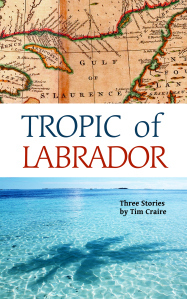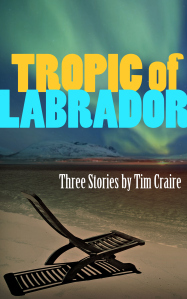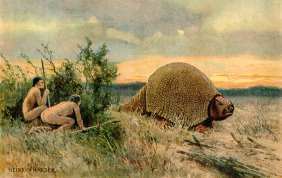Tim Craire's Blog, page 4
January 23, 2017
Ansarks!
The sheep-eating (and people-eating, dwarf-eating, etc.) ansarks described in High Iron are very similar to Andrewsarchus, an extinct predator that lived around 40 million years ago in Mongolia. Five or six feet tall . . . formidable neighbors.
[image error]
http://walkingwith.wikia.com/wiki/Andrewsarchus


January 18, 2017
Heroic fantasy novel: High Iron
Aiman Shearer and his family are content to live on the edge of their world, far from the empires of wizards and the cities of young industry, slowly building a prosperous farm after decades of plague and fire. But marauding dunters are exploiting steam power to seize land, and the cities of wizards are determined to consolidate influence in this new age of rails and cannon. Neither can ignore Aiman’s flourishing alpine village of Emmervale. Aiman and Emmervale must seek allies where they can find them; this may mean reclusive dwarves or eccentric outlaws.
Excerpt:
The dwarf clasped my hand. I am sorry to say that I jolted, somewhat, because I realized he was missing a finger. He held up the hand; the smallest was indeed gone.
“Lost in the trade,” he said. “Hope you don’t mind.”
“Of course not,” I said.
“We were diggers, once. Now we are blasters as well. I could greet with my left, but that’s no improvement,” he said. He held up that hand, and it too was short a finger, or most of one—the pointer in this case. He nodded down toward his explosives. “There’s the problem. But they have not taken the rest of me yet.”
January 15, 2017
Keeping Shakespeare alive!
As we get farther and farther from Shakespeare, chronologically, English continues to change, and his language will be continually harder for modern readers to follow. One way to counteract this is to revive now-uncommon words that he used.
“Brabble” is an old word for a fight which Shakespeare used in Twelfth Night and Titus Andronicus. It is defined on this amazing site:
Brabble appears in some current dictionaries as an obsolete word, but in its sense of prattle or jabber. But this meaning of “quarrel” is clear in the plays as cited, and is given by Shakespeareswords.com.
Brabble is used this way in my new fantasy novel, High Iron. I give it to a dwarf, who is talking about a long-ago schoolyard fight (although he wasn’t actually in a schoolyard).
The word sounds like a fight already, doesn’t it? Easy enough for our brains to latch onto.
Another old word I revive is bourn, which means boundary — either in a figurative sense, or literally a land boundary. It appears seven times in Shakespeare, according to the site above. Once again I give it to dwarves, in High Iron. Dwarves just seem Shakespearean, don’t they?
This word “bourn” doesn’t seem as intuitive to me as brabble does . . . but now perhaps my readers will grasp it with no second thoughts when they see it in Shakespeare.
High Iron has a third Shakespearean word, also, which is . . . I can’t remember, and didn’t make a note. But readers will get it at least from context when they come to it, trust me!
[image error]


January 3, 2016
Searching for Melamid
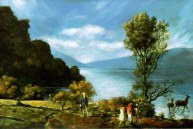 I heard a reference to Alex Melamid today, on a repeat NPR show — the TED Talk series. Alexander Melamid is the supposed Russian-born artist who collaborated with a Vitaly Komar in 1994 in a project which claimed to survey people around the world about what their favorite painting would look like, and then generate paintings to fit.
I heard a reference to Alex Melamid today, on a repeat NPR show — the TED Talk series. Alexander Melamid is the supposed Russian-born artist who collaborated with a Vitaly Komar in 1994 in a project which claimed to survey people around the world about what their favorite painting would look like, and then generate paintings to fit.
You’ve heard of this, right? It was an article in The Nation in March 1994, followed by a paint-by-numbers publication and a website.
A New York Times article of September 2014 outlines another odd project of Melamid’s — art based on plumbing:
–and the journalist, while asking questions that indicate she knows that his ideas are intentionally outrageous, seems to assume that he is who he says he is.
He even has an Encyclopedia Brittanica entry, with his sidekick Komar:
http://www.britannica.com/biography/Vitaly-Komar-and-Alex-Melamid
And he has a photo and biographical information on the site of a publication, Artenol — the name is claimed to be inspired by Tylenol — which includes photo and bios from a number of collaborators:
http://artenol.org/about-us.html
All well and good, but when the painting-for-the-masses article ran in The Nation twenty years ago, the editors appeared to acknowledge that the names Komar and Melamid were invented. They printed a letter to the editor which read:
“I greatly enjoyed your humor issue. Congratulations to whoever thought up the names for the “emigre artists.” “Komar” and “Melamid” sound like new miracle plastics from Du Pont.” — Dennis Cassidy, Portland Ore. (The Nation, Letters, May 16 1994) (I paid the blasted ten bucks to be able to access the archive)
The editors also refer to readers who “got it.”
So it seems Melamid is an assumed name, a Yes Man before his time; but with the Yes Men, the internet has caught on, and one can find information about their actual names. Melamid, whoever he is, seems to have created an unchallenged persona.


November 1, 2015
Rejected cover
I used a pro for this book cover — glad I did. This cover below was more or less what I thought of, for my story about positive-thinking climate migrants in Canada in 2080:
x
x
x
x
x
x
o
o
x
x
I had thought a vintage map would be interesting, but . . . I like my cover guy’s idea much better:


March 21, 2014
Giant prehistoric armadillos!
In my fantasy novel The Pennants of Larkhall, I have a scene with a very large armadillo-like animal called an armorback. I honestly did not know, or at any rate the front-most portions of my brain had forgotten, that such animals really lived: glyptodons and doedicuruses. Here are photos:
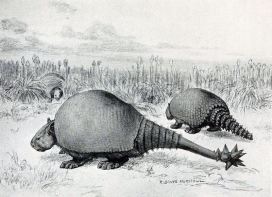
Doedicurus (L) and glyptodon
They were some of the American megafauna that went extinct about the time that humans moved in. So there may indeed have been scenes like this one:
Let’s put these on the list to clone and reintroduce, once we’ve got mammoths established.


March 3, 2014
Picking through the ruins of a civilization
 It looks like my son and I have arrived too late to see the heyday of the Lord of the Rings Risk Trilogy Edition community. Such a sinking feeling when you find a great website/forum and realize that the last post was two years ago, with most of the action taking place long before that. The oldness of the internet sometimes catches me by surprise.
It looks like my son and I have arrived too late to see the heyday of the Lord of the Rings Risk Trilogy Edition community. Such a sinking feeling when you find a great website/forum and realize that the last post was two years ago, with most of the action taking place long before that. The oldness of the internet sometimes catches me by surprise.
This is the site:
http://lordoftheringsrisk.com/forums/index.php
The streets are well-ordered, but empty. It’s like a collection of grand Mayan stelae and ball courts left empty in an abandoned city, c. 900 A.D. It’s like the silted harbors of Greytown, Nicaragua, a decade after the Panama Canal has opened and no one needs to travel overland across the isthmus anymore. It’s like the hall of images in the dead city of Charn. It’s like . . . you see what I mean.


February 27, 2014
Risk!
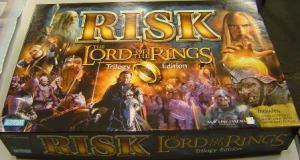 I picked up the game Risk a few weeks ago, and my 10-year-old son and I have been playing.
I picked up the game Risk a few weeks ago, and my 10-year-old son and I have been playing.
The memories it brings back! I played the game a lot with my brother, and sometimes with cousins, when I was young, and it’s remarkable how the idiosyncrasies have stuck with me — buried in my memory but now unfrozen. I’m six years younger than my brother, so he usually crushed me, but I enjoyed even the grinding losses, I guess. I remember how it felt to finally piece together a region and then watch him nullify the gain by smashing Kamchatka! I remember wavering about an attack, and wondering aloud if I should chance it; he would tell me impatiently:
“That’s why it’s called Risk!”
And now I remember (and experience again) the despair of getting more and more in the hole — you find yourself looking forward to the next turn, for a chance to reinforce with a few more armies (they are called “batttalions” in this version, the Lord of the Rings set) but then you realize that your opponent is stacking up even more battalions, turn after turn, and even with the smartest moves you’ll be unlikely to ever catch up . . . I think it may be a good lesson for a 10-year-old: you can’t depend on good luck overturning the consequences of a series of bad decisions.
And I’m also struck that my son is very good at the game. Maybe he got his uncle’s genes for it.


February 9, 2014
How to exit
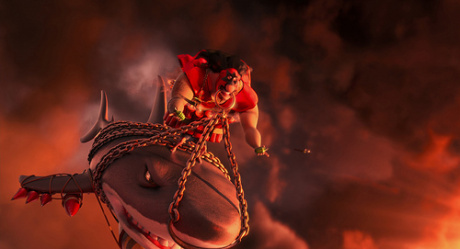 I hear so much about people being stricken by dementia and/or Alzheimer’s, and forgetting who their loves ones are; I really hope that I can avoid being a burden to anyone around who still cares about m
e, if those diseases are my fate.
I hear so much about people being stricken by dementia and/or Alzheimer’s, and forgetting who their loves ones are; I really hope that I can avoid being a burden to anyone around who still cares about m
e, if those diseases are my fate.
I think the ideal way to go would be line Eduardo/El Macho in Despicable Me 2, who rides a shark strapped with explosives into a live volcano.
Ah, but who knows. Will I know what’s going on it time to take control? Will I slide blithely into oblivion? Will my loved ones be so grief-stricken that my exit in a hospice bed in the front room would be easier on them? (Is it presumptuous of me to assume there will be anyone around who will give a rat’s ass?) Is it selfish to want to just ride a shark into a volcano, when one is terminally ill?


January 13, 2014
A new Goodreads fan!
 Terrific news! Mr. Grok Testuser on Goodreads is reading one of my books — twice! I’m waiting for the scathing page-long review.
Terrific news! Mr. Grok Testuser on Goodreads is reading one of my books — twice! I’m waiting for the scathing page-long review.





